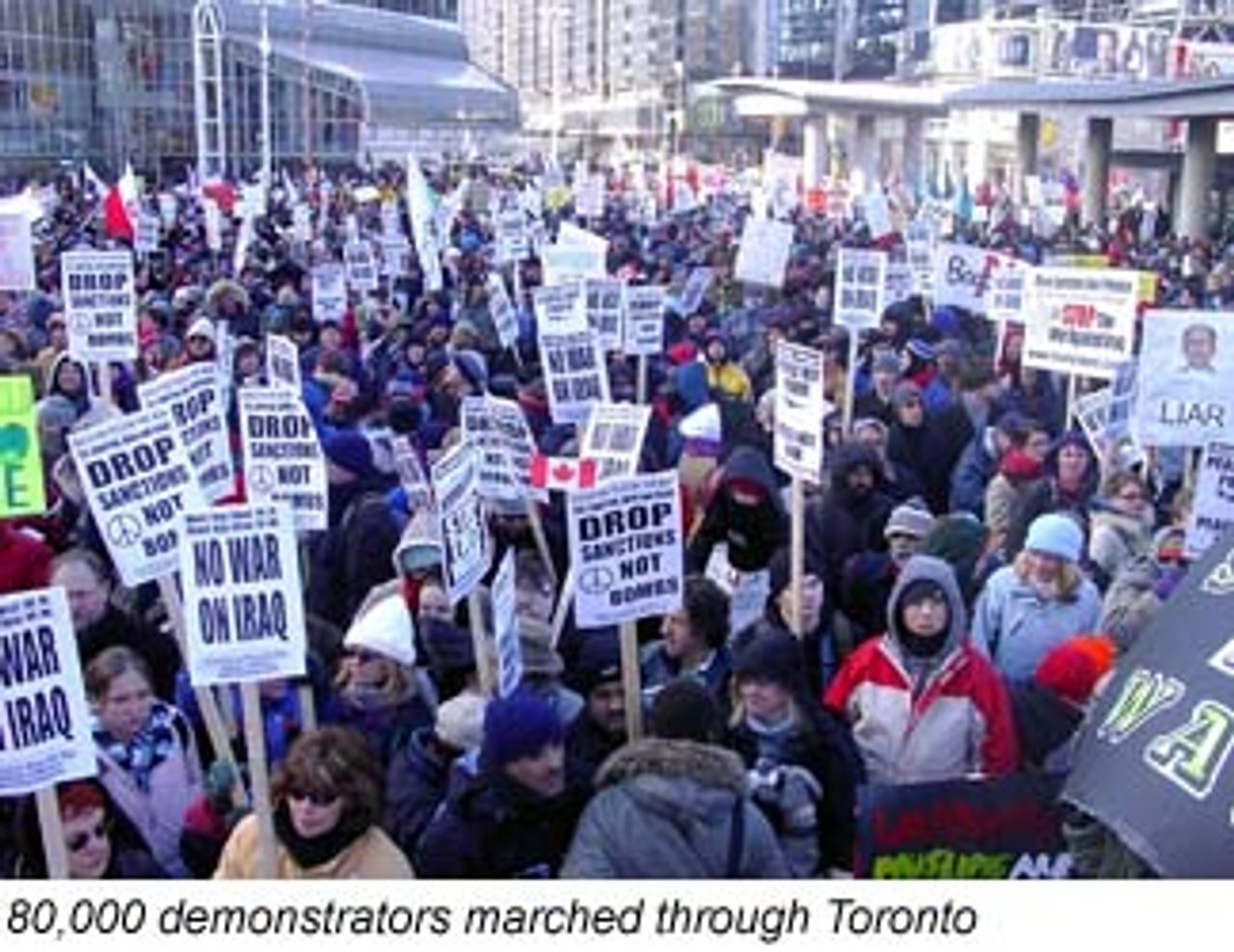An estimated 80,000 people marched through Toronto Saturday in a colorful and spirited demonstration, despite temperatures of 13 degrees below zero Celsius. Compared to the last antiwar rally on January 18, when about 10,000 participated, this march was not only far larger, but much younger, more working class and diverse.

Thousands of students, both high school and college, joined the march, as did immigrant working people from a vast array of countries. Banners and placards recorded the presence of many groups of school teachers, as well as doctors, artists and lawyers against the war. Trade union bodies officially represented included the Canadian Labor Congress, Steelworkers, Auto Workers and CUPE, the public sector union, although very few union members marched under their banners.
Overall, the vast majority of people did not march in organized contingents but with family and friends, often carrying homemade signs, such as “US equals terrorism” and “Not anti-American, anti-militarism.” One handwritten placard asserted “three truths”: “1. George Bush was not voted President; 2. The US has weapons of mass destruction; 3. The media tells lies.”
Socialist Equality Party supporters made in important intervention, distributing nearly 2,000 copies of the WSWS statement, “The tasks of the anti-war movement”.
The general mood was one of deep concern at the prospect of war and extreme hostility to US President Bush and British Prime Minister Tony Blair, combined with hopes and illusions that the massive worldwide protests would convince other governments to take a stand against them.
Most speakers on the platform promoted these illusions. The organizers of the demonstration, the Coalition Against the War, consisting of some 30 religious, community, trade union and student groups, gave pride of place to Jack Layton, the recently elected leader of the federal New Democratic Party. Whereas several other speakers denounced Blair, Layton remained silent on his fellow social democrat’s essential part in backing Washington.
He also failed to give any commitment to oppose Canadian involvement in the war if it is explicitly sanctioned by the UN Security Council. Instead, Layton urged the crowd to pressure Canadian Prime Minister Jean Chretien into taking the same stance as French President Jacques Chirac, who has differed with the Bush administration only from the standpoint of protecting French national interests. Layton initiated a chant of “Vive la France!”
The Canadian government has already joined the military buildup against Iraq, dispatching fresh contingents to the Gulf and Afghanistan. But Layton’s main message was that Chretien could be convinced to “reject militarism” in order to “invest in the well-being of Canadians.” He reiterated this in a media interview after the march. “Surely, after the demonstrations this weekend, we’re going to see a stiffening of the spine and see our Canadian government issue a clarion call for peace to Bush and to the United Nations Security Council,” he said.
While marchers greeted Layton and other speakers with uncritical applause, those who spoke to the WSWS expressed skepticism in the likelihood of any real change of direction by the political establishment.
A young computer programmer said he had been reading the WSWS for some time. “I don’t buy anything put forward by the world media,” he said. “Marches like this show that we are not a minority. I don’t think they will stop the war, but this is all we can do.
“Governments are obviously not going to listen. Look at Italy and Spain, where the people are opposed but the governments are taking part in the war. I have realized that votes don’t count. Still, things are very confusing. I don’t know what to do after this march. Obviously, war will start. We will have to see how people respond around the world.”
Alec, a Grade 13 student, said a revolution is necessary to stop the war: “We need to come up with a revolutionary way of dealing with people and profit and the economy. I think that one of the biggest reasons for this war is oil. If profits weren’t an issue, this war wouldn’t be an issue. How can we justify the killing of human life for profit? And the fact that people are war-mongering for money is a crime against humanity, an atrocity, a crime against peace.”
